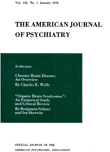ADRENOCORTICAL FUNCTION IN SCHIZOPHRENIA
Abstract
Adrenocortical function of chronic schizophrenics was investigated. The concentration of adrenal steroids (17-hydroxycorticosteroids) in the peripheral blood was determined at 8 am.; after the intravenous administration of various amounts of ACTH or of a pryogenic substance (Piromen); and after the subcutaneous injection of regular insulin. These drugs were employed to assess adrenocortical and pituitary-adrenocortical responsivity. Similar studies were made upon a comparable group of normal subjects. The adrenocortical and pituitary-adrenocortical reactivity of chronic schizophrenic and normal subjects were equivalent. There was no evidence of any impairment of adrenocortical physiology in the chronic schizophrenic patient.
Access content
To read the fulltext, please use one of the options below to sign in or purchase access.- Personal login
- Institutional Login
- Sign in via OpenAthens
- Register for access
-
Please login/register if you wish to pair your device and check access availability.
Not a subscriber?
PsychiatryOnline subscription options offer access to the DSM-5 library, books, journals, CME, and patient resources. This all-in-one virtual library provides psychiatrists and mental health professionals with key resources for diagnosis, treatment, research, and professional development.
Need more help? PsychiatryOnline Customer Service may be reached by emailing [email protected] or by calling 800-368-5777 (in the U.S.) or 703-907-7322 (outside the U.S.).



